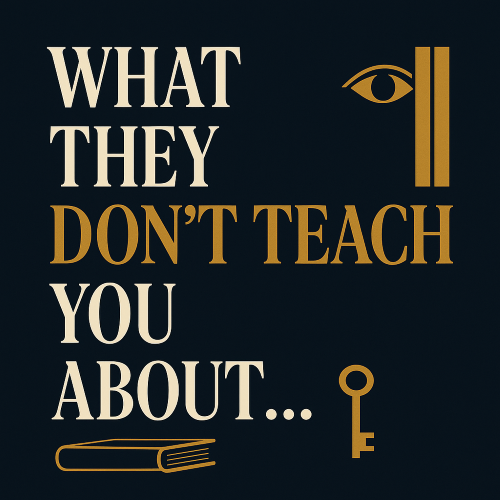What They Don’t Teach You About Managing Anxiety & Depression
(Unspoken Truths | Mental Health, Self-Compassion & Healing Series)
They tell you to “cheer up” or “calm down.”
But they don’t teach you how to navigate the heavy fog of depression or the endless buzzing of anxiety.
Let’s talk about what they don’t teach you:
Managing anxiety and depression isn’t about pretending to be okay — it’s about learning how to cope, heal, and ask for help without shame.
WHAT THEY DON’T TEACH YOU:
1. Mental Health Struggles Aren’t Just in Your Head — They’re in Your Body Too
Tension in your chest
Exhaustion after simple tasks
Digestive issues or sleep disruptions
Anxiety and depression affect your whole system — not just your mood.
2. You Can Look “Functional” and Still Be Struggling Deeply
Smiling, working, posting online — and still feeling numb, hopeless, or on edge.
Pain doesn’t always look dramatic — sometimes it just looks like pretending.
3. You Can’t Always Think Your Way Out of It
Affirmations help, but sometimes your brain chemistry or past trauma is louder than logic.
Healing takes more than “positive vibes.” Sometimes it takes therapy, medication, or serious rest.
4. Your Triggers Aren’t Weakness — They’re Unhealed Wounds Asking for Care
That overreaction? That panic? That deep sadness?
They're not “crazy” — they’re cries from parts of you that haven’t felt safe in a long time.
5. You’re Not Lazy — You’re Tired From Fighting Battles No One Sees
When you can’t get out of bed, clean your space, or reply to messages…
It’s not about willpower. It’s about survival.
6. The Right People Won’t Shame You for What You’re Feeling
You don’t need to hide your emotions from everyone.
You need safe spaces where your pain isn’t minimized — but understood.
7. Recovery Isn’t Linear — And That’s Okay
You’ll have better days, and then tough ones.
You’ll make progress, then feel like you’re back at square one.
That’s not failure — that’s the process.
8. You Deserve Support — Even If You Can’t Explain Everything Yet
You don’t have to “prove” your pain.
You don’t need the perfect words to ask for help.
“I’m not okay” is reason enough to reach out.
ANXIETY & DEPRESSION SURVIVAL CHECKLIST:
Do I give myself permission to feel without judgment?
Have I found small tools that ground me (music, breath, walks, journaling)?
Am I seeking connection — even when I feel like isolating?
Do I know who I can call or text when the fog gets too heavy?
Am I open to therapy, healing practices, or medication if needed?
FINAL THOUGHT:
They didn’t teach you how to manage anxiety and depression — because many still don’t understand them.
But now you know:
Your feelings are valid. Your struggle is real. Your healing is possible.
You are not a burden. You are a soul carrying pain — and you deserve care, not shame.
(Unspoken Truths | Mental Health, Self-Compassion & Healing Series)
They tell you to “cheer up” or “calm down.”
But they don’t teach you how to navigate the heavy fog of depression or the endless buzzing of anxiety.
Let’s talk about what they don’t teach you:
Managing anxiety and depression isn’t about pretending to be okay — it’s about learning how to cope, heal, and ask for help without shame.
WHAT THEY DON’T TEACH YOU:
1. Mental Health Struggles Aren’t Just in Your Head — They’re in Your Body Too
Tension in your chest
Exhaustion after simple tasks
Digestive issues or sleep disruptions
Anxiety and depression affect your whole system — not just your mood.
2. You Can Look “Functional” and Still Be Struggling Deeply
Smiling, working, posting online — and still feeling numb, hopeless, or on edge.
Pain doesn’t always look dramatic — sometimes it just looks like pretending.
3. You Can’t Always Think Your Way Out of It
Affirmations help, but sometimes your brain chemistry or past trauma is louder than logic.
Healing takes more than “positive vibes.” Sometimes it takes therapy, medication, or serious rest.
4. Your Triggers Aren’t Weakness — They’re Unhealed Wounds Asking for Care
That overreaction? That panic? That deep sadness?
They're not “crazy” — they’re cries from parts of you that haven’t felt safe in a long time.
5. You’re Not Lazy — You’re Tired From Fighting Battles No One Sees
When you can’t get out of bed, clean your space, or reply to messages…
It’s not about willpower. It’s about survival.
6. The Right People Won’t Shame You for What You’re Feeling
You don’t need to hide your emotions from everyone.
You need safe spaces where your pain isn’t minimized — but understood.
7. Recovery Isn’t Linear — And That’s Okay
You’ll have better days, and then tough ones.
You’ll make progress, then feel like you’re back at square one.
That’s not failure — that’s the process.
8. You Deserve Support — Even If You Can’t Explain Everything Yet
You don’t have to “prove” your pain.
You don’t need the perfect words to ask for help.
“I’m not okay” is reason enough to reach out.
ANXIETY & DEPRESSION SURVIVAL CHECKLIST:
Do I give myself permission to feel without judgment?
Have I found small tools that ground me (music, breath, walks, journaling)?
Am I seeking connection — even when I feel like isolating?
Do I know who I can call or text when the fog gets too heavy?
Am I open to therapy, healing practices, or medication if needed?
FINAL THOUGHT:
They didn’t teach you how to manage anxiety and depression — because many still don’t understand them.
But now you know:
Your feelings are valid. Your struggle is real. Your healing is possible.
You are not a burden. You are a soul carrying pain — and you deserve care, not shame.
3 months ago

